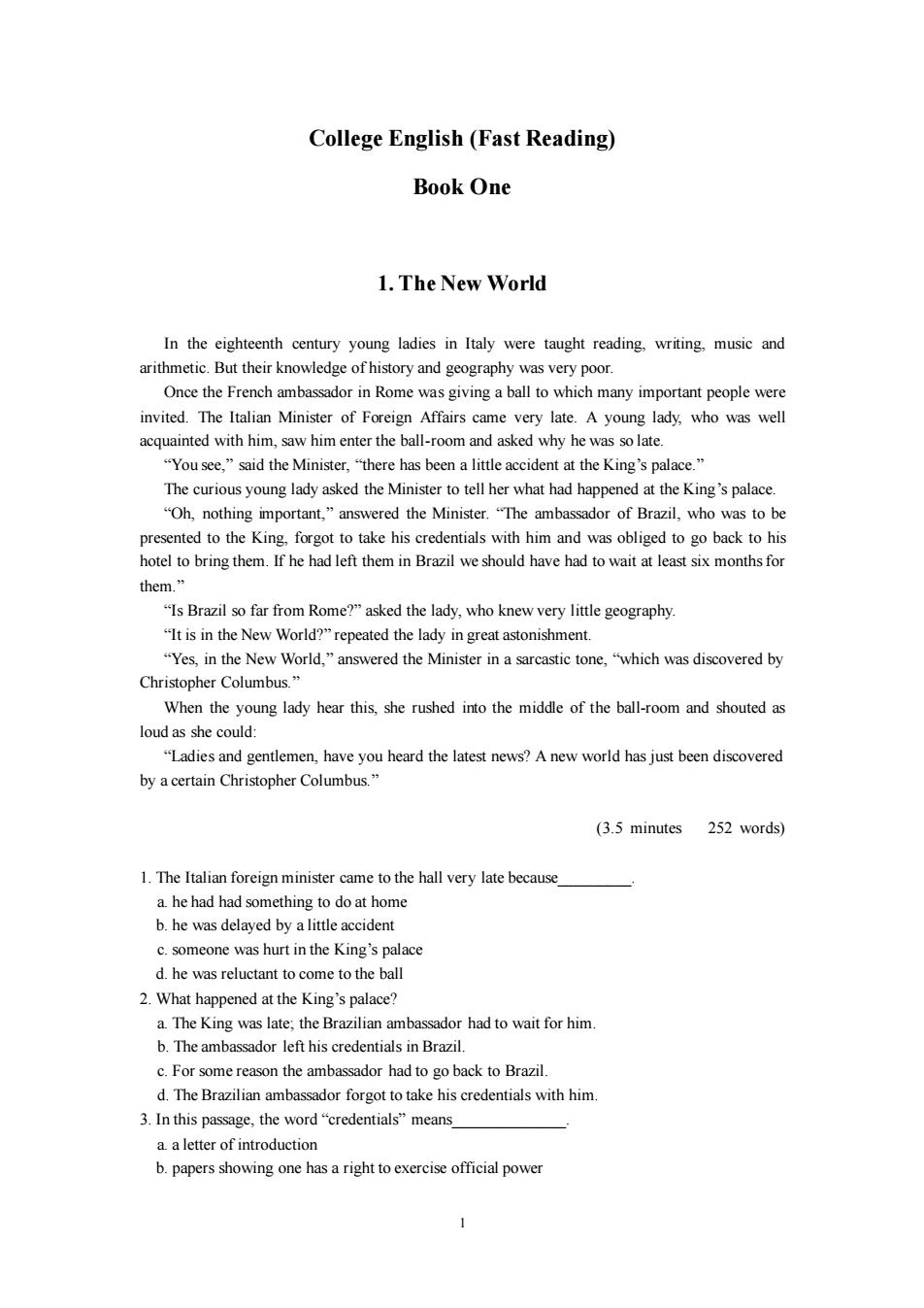
College English (Fast Reading) Book One 1.The New World In the eighteenth century young ladies in Italy were taught reading,writing,music and arithmetic.But their knowledge of history and geography was very poor. Once the French ambassador in Rome was giving a ball to which many important people were very late.A young lady,who was wel acquainted with him,saw him enter the ball-room and asked why he was so late. "You see."said the Minister,"there has been a little accident at the King's palace. The curious young lady asked the Minister to tell her what had happened at the King's palace. "Oh.nothing important."answered the Minister."The ambassador of Brazil.who was to be ented to the King.forgot to take his credentials with him and was obliged to go back to his ad left them in Brazil we should have had t lea nths for them. "Is Brazil so far from Rome?"asked the lady,who knew very little geography. "It is in the New World?"repeated the lady in great astonishment. "Yes,in the New World,"answered the Minister in a sarcastic tone."which was discovered by Christopher Columbus." When the young ady hear this he the middle of the ball-room and houed as loud as she could: "Ladies and gentlemen,have you heard the latest news?A new world has just been discovered by a certain Christopher Columbus." (3.5 minutes 252 words) 1.The Italian foreign minister came to the hall very late because a.he hadhad something to do at home b.he was delayed by a little accident .someone was hurt in the King'sp d.he was reluctant to come to the bal 2.What happened at the King's palace? a.The King was late;the Brazilian ambassador had to wait for him b.The ambassador left his credentials in Brazil. n e for some 3.In this passage,the word"credentials"means a.aletter of introduction b.papers showing one has a right to exercise official power
1 College English (Fast Reading) Book One 1. The New World In the eighteenth century young ladies in Italy were taught reading, writing, music and arithmetic. But their knowledge of history and geography was very poor. Once the French ambassador in Rome was giving a ball to which many important people were invited. The Italian Minister of Foreign Affairs came very late. A young lady, who was well acquainted with him, saw him enter the ball-room and asked why he was so late. “You see,” said the Minister, “there has been a little accident at the King’s palace.” The curious young lady asked the Minister to tell her what had happened at the King’s palace. “Oh, nothing important,” answered the Minister. “The ambassador of Brazil, who was to be presented to the King, forgot to take his credentials with him and was obliged to go back to his hotel to bring them. If he had left them in Brazil we should have had to wait at least six months for them.” “Is Brazil so far from Rome?” asked the lady, who knew very little geography. “It is in the New World?” repeated the lady in great astonishment. “Yes, in the New World,” answered the Minister in a sarcastic tone, “which was discovered by Christopher Columbus.” When the young lady hear this, she rushed into the middle of the ball-room and shouted as loud as she could: “Ladies and gentlemen, have you heard the latest news? A new world has just been discovered by a certain Christopher Columbus.” (3.5 minutes 252 words) 1. The Italian foreign minister came to the hall very late because_________. a. he had had something to do at home b. he was delayed by a little accident c. someone was hurt in the King’s palace d. he was reluctant to come to the ball 2. What happened at the King’s palace? a. The King was late; the Brazilian ambassador had to wait for him. b. The ambassador left his credentials in Brazil. c. For some reason the ambassador had to go back to Brazil. d. The Brazilian ambassador forgot to take his credentials with him. 3. In this passage, the word “credentials” means______________. a. a letter of introduction b. papers showing one has a right to exercise official power
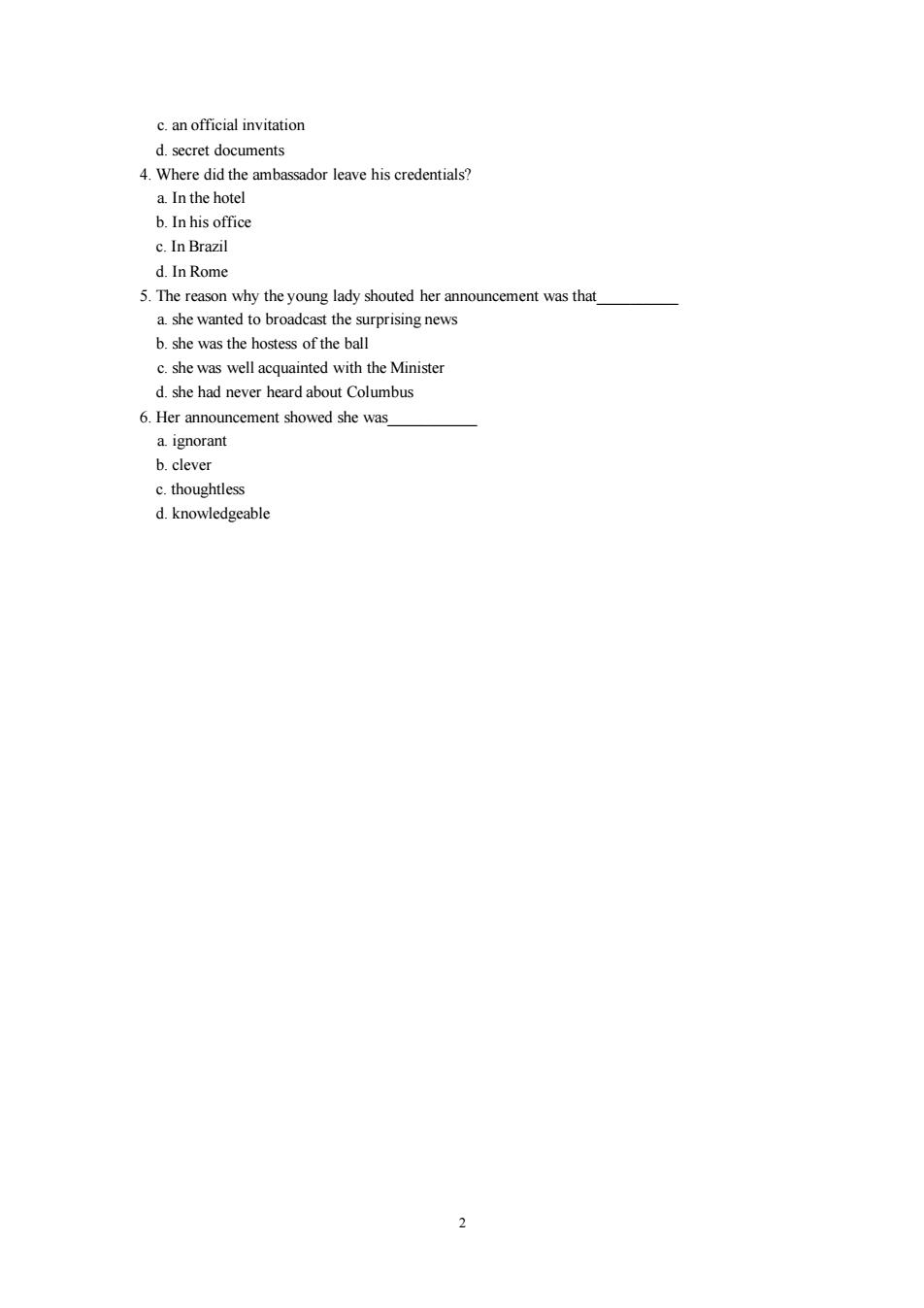
c.an official invitation 4.Where did the ambassador leave his credentials? a.In the hotel b.In his office c.In Brazil d.In Rome 5.The reason why the young lady shouted her announcement was that a.she wanted to broadeast the surprising news b.she was the hostess of the ball c.she was well acquainted with the Minister d.she had never heard about Columbus 6.Her announcement showed she was a.ignorant b.clever c.thoughtless d.knowledgeable
2 c. an official invitation d. secret documents 4. Where did the ambassador leave his credentials? a. In the hotel b. In his office c. In Brazil d. In Rome 5. The reason why the young lady shouted her announcement was that__________ a. she wanted to broadcast the surprising news b. she was the hostess of the ball c. she was well acquainted with the Minister d. she had never heard about Columbus 6. Her announcement showed she was___________ a. ignorant b. clever c. thoughtless d. knowledgeable
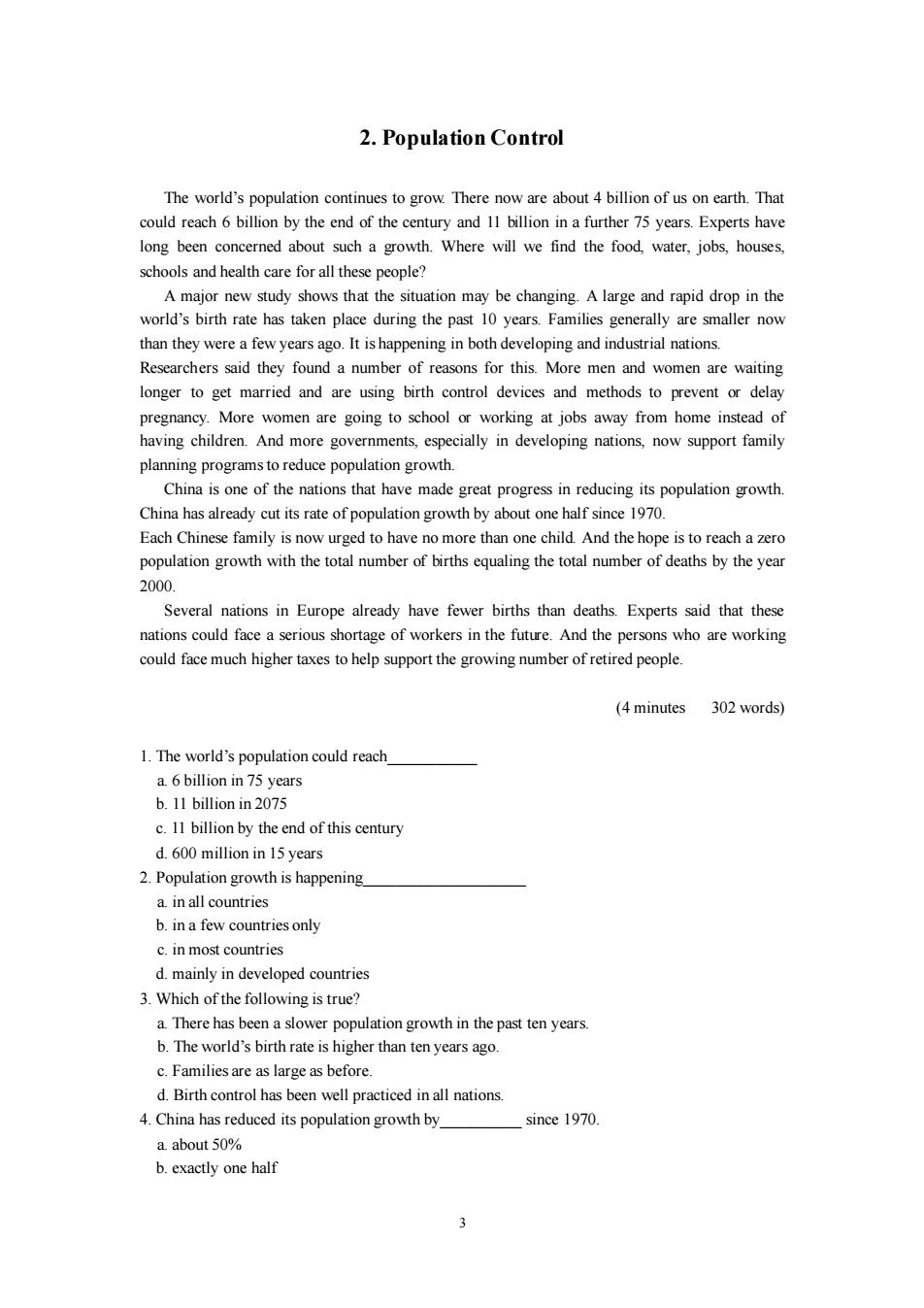
2.Population Control The world's population continues to grow There now are about 4 billion of us on earth.That could reach 6 billion by the end of the century and 11 billion in a further 75 years.Experts have long been concerned about such a growth.Where will we find the food.water.jobs.houses A major new study shows that the situation may be changing.A large and rapid drop in the world's birth rate has taken place during the past 10 years.Families generally are smaller now than they were a few years ago.It is happening in both developing and industrial nations. Researchers said they found a number of reasons for this.More men and women are waiting longer to get married and are using birth control devices and methods to prevent or delay men are going to schoolo having children.And more governments,especially in developing nations,now support family planning programsto reduce population growth. China is one of the nations that have made great progress in reducing its population growth. China has already cut its rate of population growth by about one half since 1970. Each Chinese family is now urged tohave no more than one child And the hope is to reach aer with the total nu the yea Several nations in Europe already have fewer births than deaths.Experts said that these nations could face a serious shortage of workers in the future.And the persons who are working could face much higher taxes to help support the growing number of retired people. (4 minutes 302 words) 1.The world's population could reach a.6 billion in 75 years b.11 billion in 2075 .by theend of this century d.600 million in 15 years 2.Population growth is happening a in all countries b.ina few countriesonly e.in most co d.mainly in developed countries 3.Which of the following is true? a.There has been a slower population growth in the past ten years b.The world's birth rate is higher than ten years ago. .Familiesare as large s before d.been ell practiced 4.China has reduced its population growth by _since 1970. a.about 50% b.exactly one half
3 2. Population Control The world’s population continues to grow. There now are about 4 billion of us on earth. That could reach 6 billion by the end of the century and 11 billion in a further 75 years. Experts have long been concerned about such a growth. Where will we find the food, water, jobs, houses, schools and health care for all these people? A major new study shows that the situation may be changing. A large and rapid drop in the world’s birth rate has taken place during the past 10 years. Families generally are smaller now than they were a few years ago. It is happening in both developing and industrial nations. Researchers said they found a number of reasons for this. More men and women are waiting longer to get married and are using birth control devices and methods to prevent or delay pregnancy. More women are going to school or working at jobs away from home instead of having children. And more governments, especially in developing nations, now support family planning programs to reduce population growth. China is one of the nations that have made great progress in reducing its population growth. China has already cut its rate of population growth by about one half since 1970. Each Chinese family is now urged to have no more than one child. And the hope is to reach a zero population growth with the total number of births equaling the total number of deaths by the year 2000. Several nations in Europe already have fewer births than deaths. Experts said that these nations could face a serious shortage of workers in the future. And the persons who are working could face much higher taxes to help support the growing number of retired people. (4 minutes 302 words) 1. The world’s population could reach___________ a. 6 billion in 75 years b. 11 billion in 2075 c. 11 billion by the end of this century d. 600 million in 15 years 2. Population growth is happening____________________ a. in all countries b. in a few countries only c. in most countries d. mainly in developed countries 3. Which of the following is true? a. There has been a slower population growth in the past ten years. b. The world’s birth rate is higher than ten years ago. c. Families are as large as before. d. Birth control has been well practiced in all nations. 4. China has reduced its population growth by__________ since 1970. a. about 50% b. exactly one half
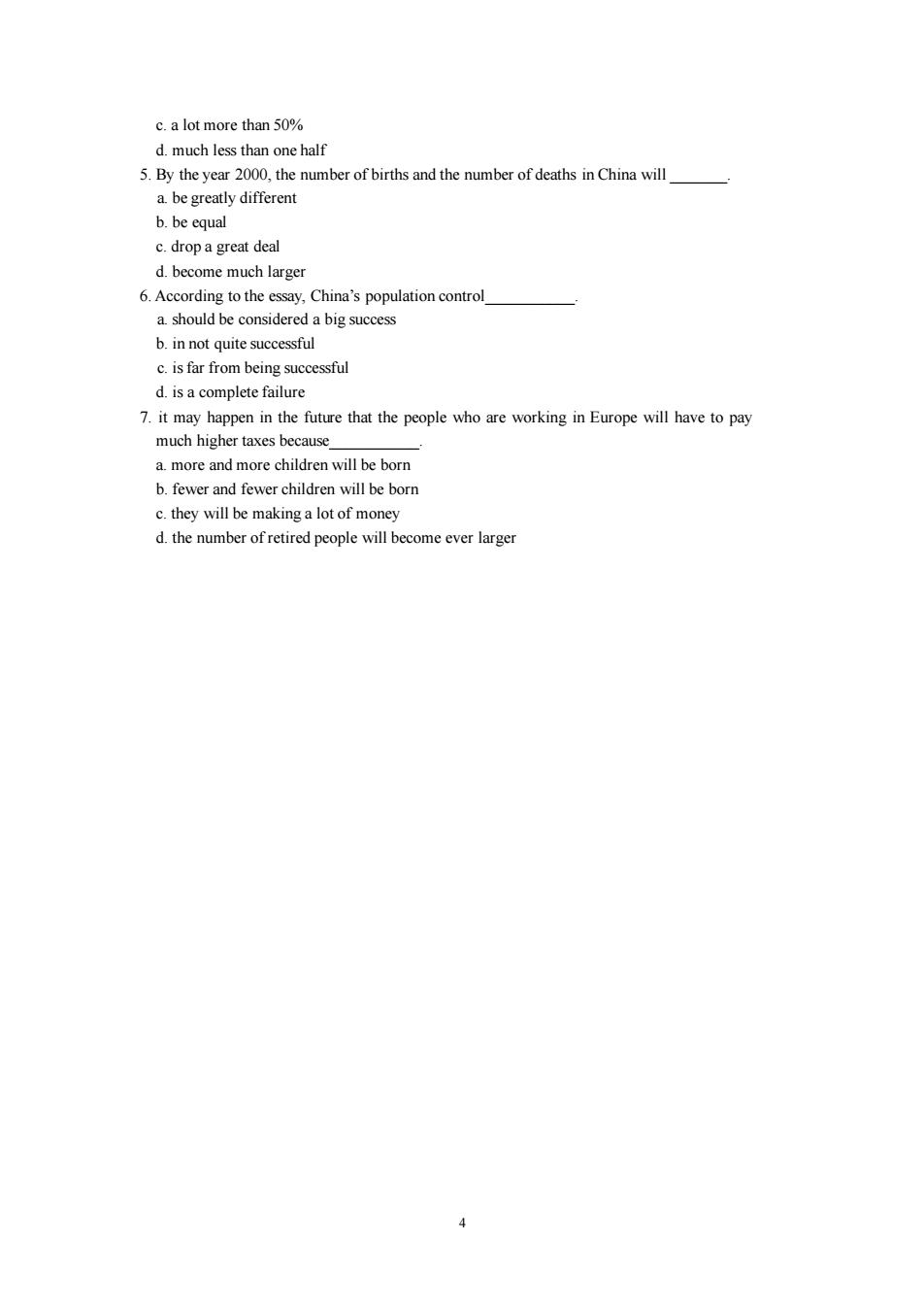
c.a lot more than 50% d.much less than one half 5.By the year 2000,the number of births and the number of deaths in China will a.be greatly different b be equal c.drop a great deal d.become much large 6.According to the essay,China's population control a.should be considered a big success b.in not quite successful c.is far from being successfu d.isa complete failure 7.it may happen in the future that the people who are working in Europe will have to pay much higher taxes because a.more and more children will be born b.fewer and fewer children will be born c they will be making a lot of money d.the number of retired people will become ever larger 4
4 c. a lot more than 50% d. much less than one half 5. By the year 2000, the number of births and the number of deaths in China will _______. a. be greatly different b. be equal c. drop a great deal d. become much larger 6. According to the essay, China’s population control___________. a. should be considered a big success b. in not quite successful c. is far from being successful d. is a complete failure 7. it may happen in the future that the people who are working in Europe will have to pay much higher taxes because___________. a. more and more children will be born b. fewer and fewer children will be born c. they will be making a lot of money d. the number of retired people will become ever larger
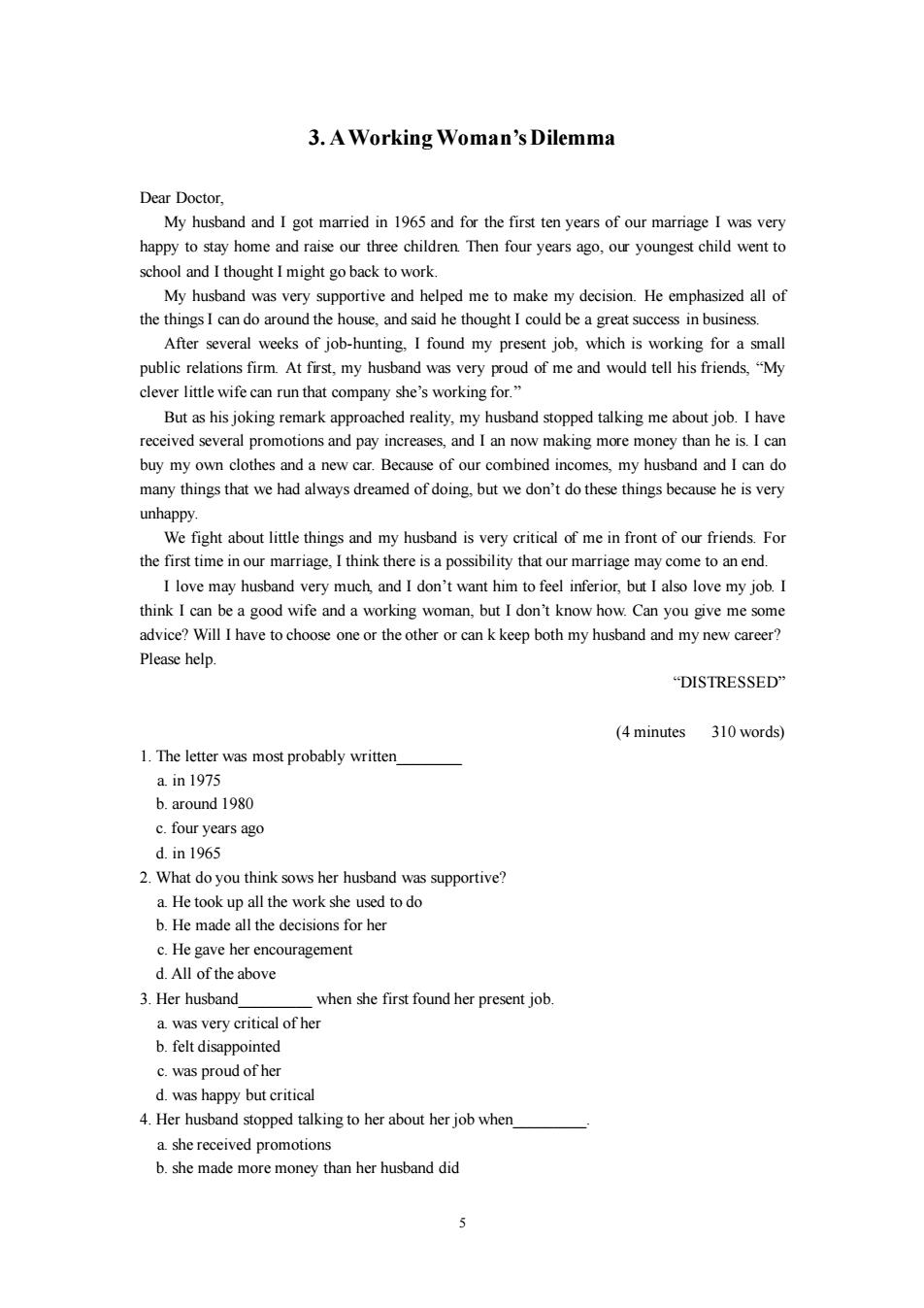
3.A Working Woman's Dilemma Dear Doctor, My husband and I got married in 1965 and for the first ten years of our marriage I was very happy to stay home and raise our three children Then four years ago,our youngest child went to school and I thought Imight go back to work. My husban was very supportive and helped meto make my ecision.He emphasized all the things I can do around the house,and said he thought I could be a great success in business After several weeks of job-hunting.I found my present job,which is working for a small public relations firm.At first,my husband was very proud of me and would tell his friends,"My clever little wife can run that company she's working for." received everal promotions and pay increases,and In now making more money than he is I car buy my own clothes and a new car.Because of our combined incomes.my husband and I can do many things that we had always dreamed of doing,but we don't do these things because he is very unhappy. We fight about little things and my husband is very critical of me in front of our friends.For ma I love may husband very much and I don't want him to feel inferior,but I also love my job.I think I can be a good wife and a working woman,but I don't know how.Can you give me some advice?Will I have to choose one or the other or can k keep both my husband and my new career? Please help. -DISTRESSED (4 minutes 310 words) 1.The letter was most probably written a.in1975 b.around1980 c.four years ago d.in1965 2.What do you think sows her husband was supportive? a.He took up all the work she used to do b he made all the decisions for ber c.He gave herenco uragement d.All of the above 3.Her husband when she first found her present job a.was very critical of her b.felt disappointed was proud ofher d.was happy but eritica 4.Her husband stopped talking to her about her job when a.she received promotions b.she made more money than her husband did 5
5 3. A Working Woman’s Dilemma Dear Doctor, My husband and I got married in 1965 and for the first ten years of our marriage I was very happy to stay home and raise our three children. Then four years ago, our youngest child went to school and I thought I might go back to work. My husband was very supportive and helped me to make my decision. He emphasized all of the things I can do around the house, and said he thought I could be a great success in business. After several weeks of job-hunting, I found my present job, which is working for a small public relations firm. At first, my husband was very proud of me and would tell his friends, “My clever little wife can run that company she’s working for.” But as his joking remark approached reality, my husband stopped talking me about job. I have received several promotions and pay increases, and I an now making more money than he is. I can buy my own clothes and a new car. Because of our combined incomes, my husband and I can do many things that we had always dreamed of doing, but we don’t do these things because he is very unhappy. We fight about little things and my husband is very critical of me in front of our friends. For the first time in our marriage, I think there is a possibility that our marriage may come to an end. I love may husband very much, and I don’t want him to feel inferior, but I also love my job. I think I can be a good wife and a working woman, but I don’t know how. Can you give me some advice? Will I have to choose one or the other or can k keep both my husband and my new career? Please help. “DISTRESSED” (4 minutes 310 words) 1. The letter was most probably written________ a. in 1975 b. around 1980 c. four years ago d. in 1965 2. What do you think sows her husband was supportive? a. He took up all the work she used to do b. He made all the decisions for her c. He gave her encouragement d. All of the above 3. Her husband_________ when she first found her present job. a. was very critical of her b. felt disappointed c. was proud of her d. was happy but critical 4. Her husband stopped talking to her about her job when_________. a. she received promotions b. she made more money than her husband did
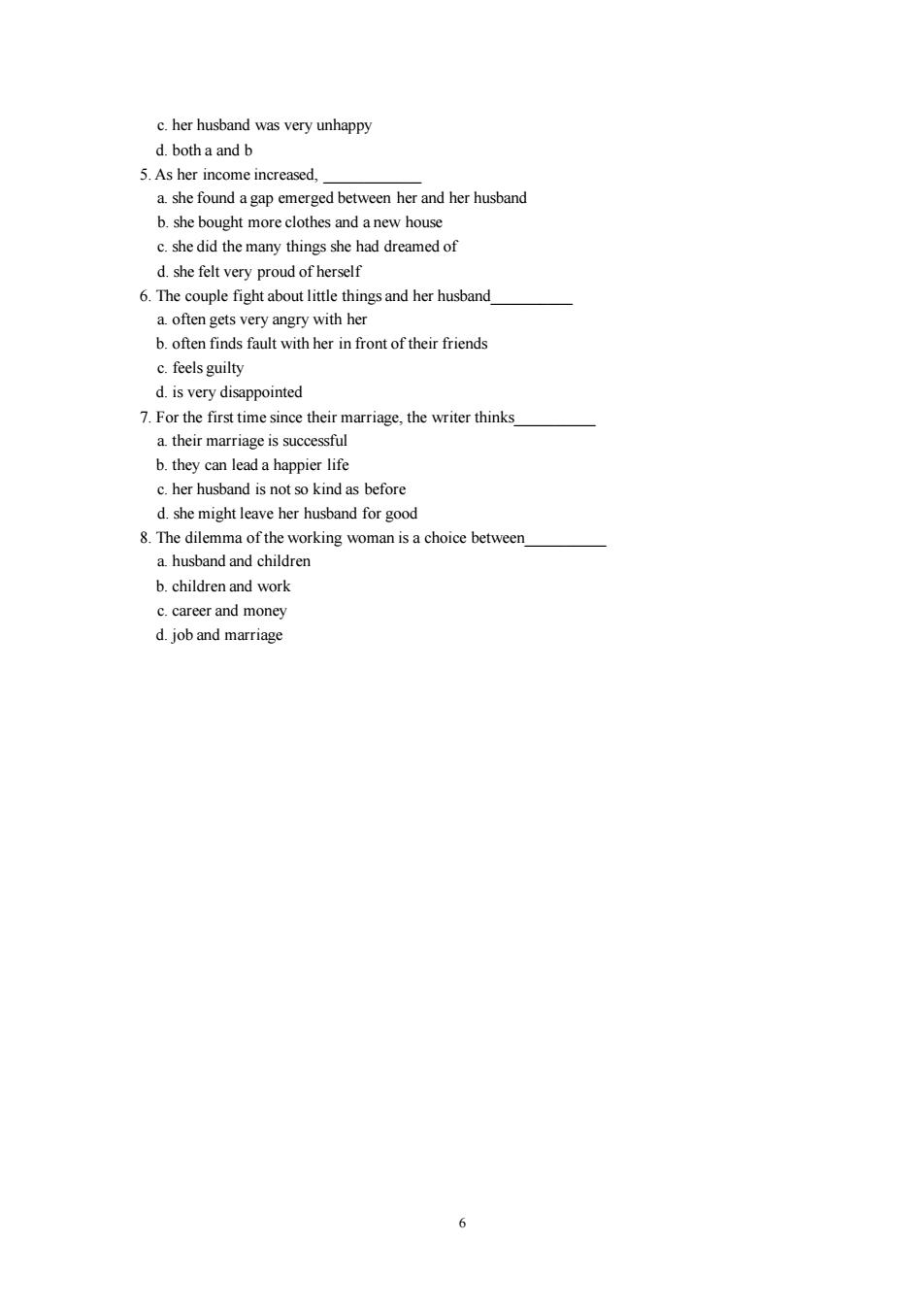
c.her husband was very unhappy d.bothaand b 5.As her income increased, a.she found a gap emerged between her and her husband b.she bought more clothes and a new house c.she did the many things she had dreamed of d.she felt very pr roud of herself 6.The couple fight about itte thingsand her husband a.often gets very angry with her b.often finds fault with her in front of their friends c.feels guilty d.is very disappointed 7.For their,the riter thnks a.their marriage is successfu b.they can lead a happier life c her husband is not so kind as before d.she might leave her husband for good 8.The dile na ofth vorking woman is a choice between ahusband and hildren b.children and work c.career and money d.job and marriage 6
6 c. her husband was very unhappy d. both a and b 5. As her income increased, ____________ a. she found a gap emerged between her and her husband b. she bought more clothes and a new house c. she did the many things she had dreamed of d. she felt very proud of herself 6. The couple fight about little things and her husband__________ a. often gets very angry with her b. often finds fault with her in front of their friends c. feels guilty d. is very disappointed 7. For the first time since their marriage, the writer thinks__________ a. their marriage is successful b. they can lead a happier life c. her husband is not so kind as before d. she might leave her husband for good 8. The dilemma of the working woman is a choice between__________ a. husband and children b. children and work c. career and money d. job and marriage
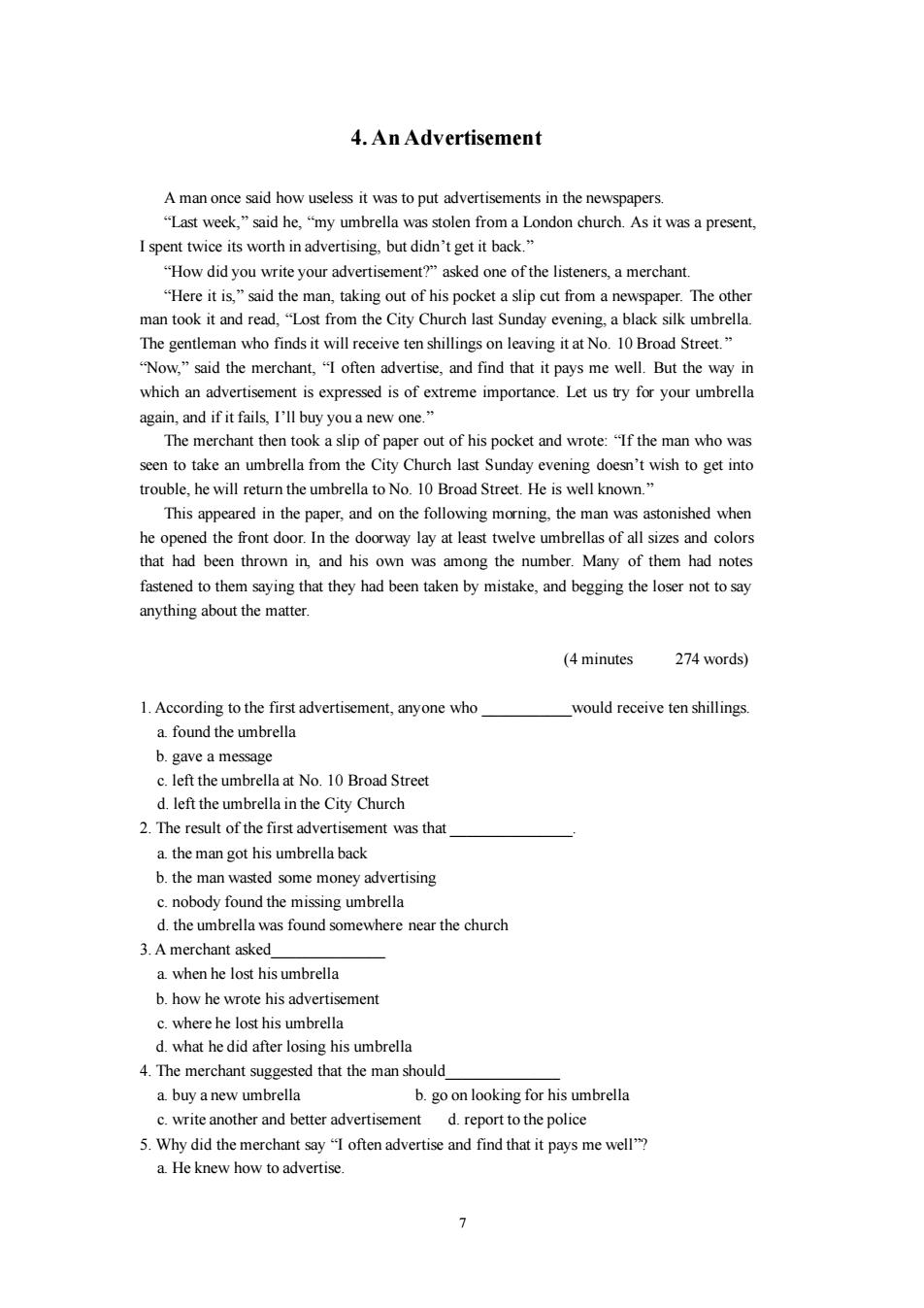
4.AnAdvertisement A man once said how useless it was to put advertisements in the newspapers. "Last week,"said he,"my umbrella was stolen from a London church.As it was a present. I spent twice its worth in advertising.but didn't get it back." How didyo write your advertisment?askedone of the merchant. "Here it is the man,takingout of his pocket a slip The the The gentleman who finds it will receive ten shillings on leaving it at No.10 Broad Street." "Now,"said the merchant,"I often advertise,and find that it pays me well.But the way in which an advertisement is expressed is of extreme importance.Let us try for your umbrella aeanandifnfalsIrmb uy you a new one. The merchant then took a slip of paper out of his pocket and wrote:"If the man who was seen to take an umbrella from the City Church last Sunday evening doesn't wish to get into trouble.he will return the umbrella to No.10 Broad Street.He is well known.' This appeared in the paper.and on the following morning.the man was astonished when he opened the front door.In the doorway lay at least twelve umbrellas of all sizes and or that had been thrown in and his n was among th Many of them had notes fastened to them saying that they had been taken by mistake,and begging the loser not to say anything about the matter. (4minutes 274 words) 1.According to the first advertisement,anyone who would receive ten shillings a.found the umbrella b.gave a message c.left the umbrella at No.10 Broad Street d.left the umbrella in the City Church a.the man got his umbrella back b.the man wasted some money advertising c.nobody found the missing umbrella d the umbrella was found somewhere near the church 3.A merchant asked a when he lost hisumbrella b.how he wrote his advertisement c.where he lost his umbrella d.what he did after losing his umbrella 4.The merchant sugested that the man sould a.buy anew umbre b.go on looking for his umbrella c.write another and better advertisement d.report to the police 5.Why did the merchant say"I often advertise and find that it pays me well" a.He knew how to advertise
7 4. An Advertisement A man once said how useless it was to put advertisements in the newspapers. “Last week,” said he, “my umbrella was stolen from a London church. As it was a present, I spent twice its worth in advertising, but didn’t get it back.” “How did you write your advertisement?” asked one of the listeners, a merchant. “Here it is,” said the man, taking out of his pocket a slip cut from a newspaper. The other man took it and read, “Lost from the City Church last Sunday evening, a black silk umbrella. The gentleman who finds it will receive ten shillings on leaving it at No. 10 Broad Street.” “Now,” said the merchant, “I often advertise, and find that it pays me well. But the way in which an advertisement is expressed is of extreme importance. Let us try for your umbrella again, and if it fails, I’ll buy you a new one.” The merchant then took a slip of paper out of his pocket and wrote: “If the man who was seen to take an umbrella from the City Church last Sunday evening doesn’t wish to get into trouble, he will return the umbrella to No. 10 Broad Street. He is well known.” This appeared in the paper, and on the following morning, the man was astonished when he opened the front door. In the doorway lay at least twelve umbrellas of all sizes and colors that had been thrown in, and his own was among the number. Many of them had notes fastened to them saying that they had been taken by mistake, and begging the loser not to say anything about the matter. (4 minutes 274 words) 1. According to the first advertisement, anyone who ___________would receive ten shillings. a. found the umbrella b. gave a message c. left the umbrella at No. 10 Broad Street d. left the umbrella in the City Church 2. The result of the first advertisement was that _______________. a. the man got his umbrella back b. the man wasted some money advertising c. nobody found the missing umbrella d. the umbrella was found somewhere near the church 3. A merchant asked______________ a. when he lost his umbrella b. how he wrote his advertisement c. where he lost his umbrella d. what he did after losing his umbrella 4. The merchant suggested that the man should______________ a. buy a new umbrella b. go on looking for his umbrella c. write another and better advertisement d. report to the police 5. Why did the merchant say “I often advertise and find that it pays me well”? a. He knew how to advertise
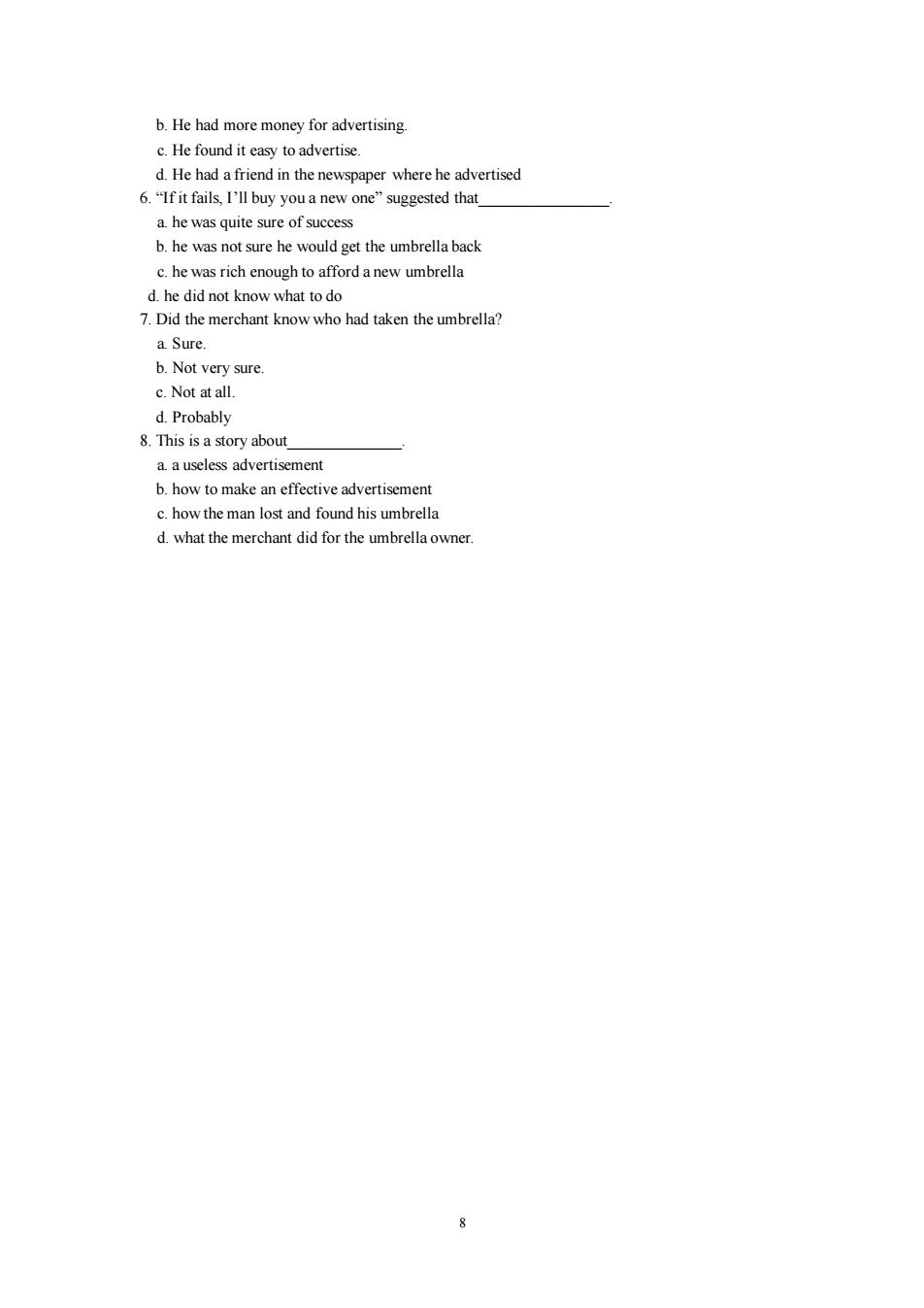
b.He had more money for advertising .He found it easy to advertise d.He had a friend in the newspaper where he advertised 6."If it fails,I'll buy you a new one"suggested that a.he was quite sure of success b.he was not sure he would get the umbrella back c.he was rich enough to afford anew umbrella d.he did not k now what to do 7.Did the merchant know who had taken the umbrella? a.Sure. h Not very sure e not at all d.Probably 8.This is a story about a.a useless advertisement b.how to make an effective advertisement c how the man lost and found his umbrella d.what the merchant did for the umbrellaowne
8 b. He had more money for advertising. c. He found it easy to advertise. d. He had a friend in the newspaper where he advertised 6. “If it fails, I’ll buy you a new one” suggested that________________. a. he was quite sure of success b. he was not sure he would get the umbrella back c. he was rich enough to afford a new umbrella d. he did not know what to do 7. Did the merchant know who had taken the umbrella? a. Sure. b. Not very sure. c. Not at all. d. Probably 8. This is a story about______________. a. a useless advertisement b. how to make an effective advertisement c. how the man lost and found his umbrella d. what the merchant did for the umbrella owner
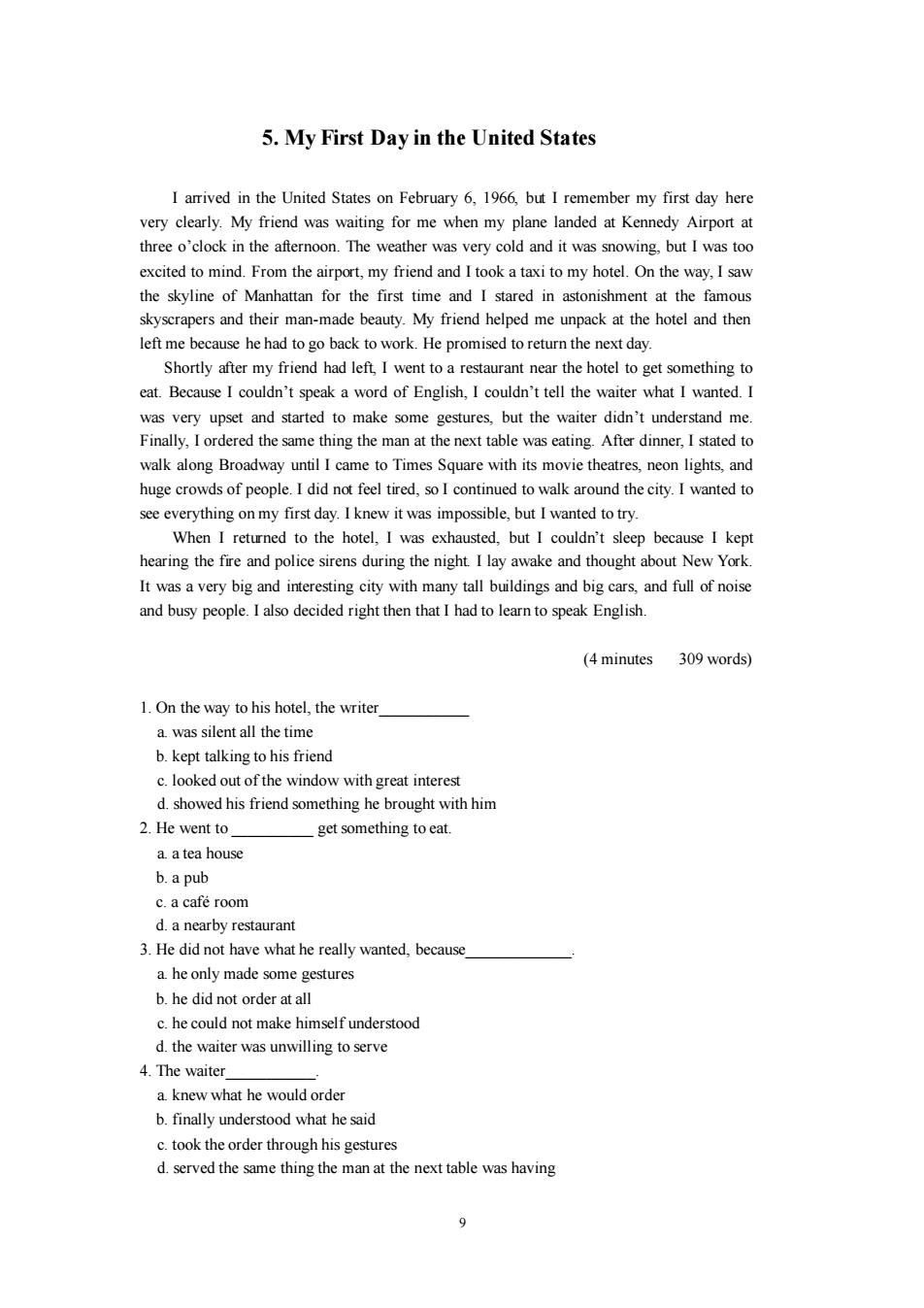
5.My First Day in the United States I amrived in the United States on February6,196 but I remember my first day here very clearly.My friend was waiting for me when my plane landed at Kennedy Airport at three o'clock in the afternoon.The weather was very cold and it was snowing.but I was too excited to mind.From the airport.my friend and Itook a taxi to my hotel.On the way,I saw e first tin me and I stared in astonishment at the skyscrapers and their man-made beauty.My friend helped me unpack at the hotel and then left me because he had to go back to work.He promised to return the next day. Shortly after my friend had left I went to a restaurant near the hotel to get something to eat Because I couldn't speak a word of English.I couldn't tell the waiter what I wanted.I was very upset and sta arted to make some gestures but the waiter didn't under tand . Finally,Iordered the same thing the man at the next table was eating.After dinner Istatedt walk along Broadway until I came to Times Square with its movie theatres,neon lights.and huge crowds of people.I did not feel tired,so I continued to walk around the city.I wanted to see everything on my first day.I knew it was impossible.but I wanted to try. When Ireturned to the hotel,I was exhausted,but I couldn't sleep because I kept hearing the fire and police sirens during the nightIlay awake and though It was a very big and interesting city with many tall buildings and big cars,and full of noise and busy people.Ialso decided right then that I had to learn to speak English. (4 minutes 309 words) 1.On the way to his hotel,the writer a.was silent all the time b.kept talking to his friend .lookedo the window with great interest is friend something 2.He went to get something to eat a.a tea house b.a pub c a cafe room d a nearby restaurant 3.He did not have what he really wanted,becaus a.he only made some gestures b.he did not order at all c.he could not make himself understood d.the waiter was unwilling to serve 4.The waiter. a knew what he would b.finally understood what he said c.took the order through his gestures d.served the same thing the man at the next table was having
9 5. My First Day in the United States I arrived in the United States on February 6, 1966, but I remember my first day here very clearly. My friend was waiting for me when my plane landed at Kennedy Airport at three o’clock in the afternoon. The weather was very cold and it was snowing, but I was too excited to mind. From the airport, my friend and I took a taxi to my hotel. On the way, I saw the skyline of Manhattan for the first time and I stared in astonishment at the famous skyscrapers and their man-made beauty. My friend helped me unpack at the hotel and then left me because he had to go back to work. He promised to return the next day. Shortly after my friend had left, I went to a restaurant near the hotel to get something to eat. Because I couldn’t speak a word of English, I couldn’t tell the waiter what I wanted. I was very upset and started to make some gestures, but the waiter didn’t understand me. Finally, I ordered the same thing the man at the next table was eating. After dinner, I stated to walk along Broadway until I came to Times Square with its movie theatres, neon lights, and huge crowds of people. I did not feel tired, so I continued to walk around the city. I wanted to see everything on my first day. I knew it was impossible, but I wanted to try. When I returned to the hotel, I was exhausted, but I couldn’t sleep because I kept hearing the fire and police sirens during the night. I lay awake and thought about New York. It was a very big and interesting city with many tall buildings and big cars, and full of noise and busy people. I also decided right then that I had to learn to speak English. (4 minutes 309 words) 1. On the way to his hotel, the writer___________ a. was silent all the time b. kept talking to his friend c. looked out of the window with great interest d. showed his friend something he brought with him 2. He went to __________ get something to eat. a. a tea house b. a pub c. a caféroom d. a nearby restaurant 3. He did not have what he really wanted, because_____________. a. he only made some gestures b. he did not order at all c. he could not make himself understood d. the waiter was unwilling to serve 4. The waiter___________. a. knew what he would order b. finally understood what he said c. took the order through his gestures d. served the same thing the man at the next table was having
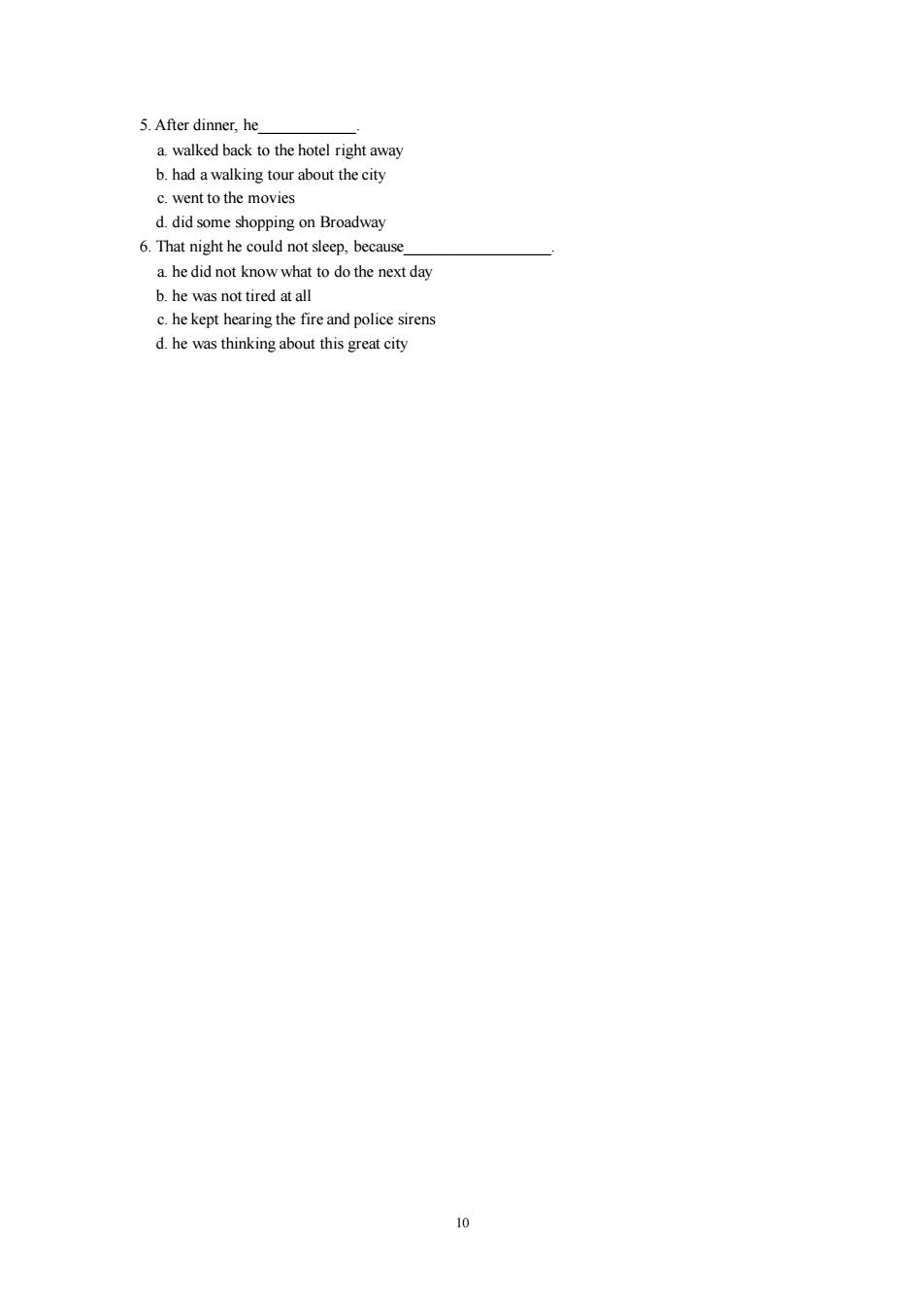
5.After dinner.be a walked back to the hotel right away b.had a walking tour about the city c.went to the movies d.did some shopping on Broadway 6.That night he could not sleep,because a he did not know what to do the next day b.he was not tired ta c.he kept hearing the fire and police sirens d.he was thinking about this great city 10
10 5. After dinner, he____________. a. walked back to the hotel right away b. had a walking tour about the city c. went to the movies d. did some shopping on Broadway 6. That night he could not sleep, because__________________. a. he did not know what to do the next day b. he was not tired at all c. he kept hearing the fire and police sirens d. he was thinking about this great city